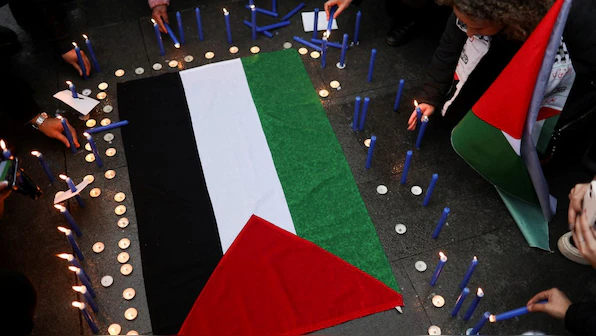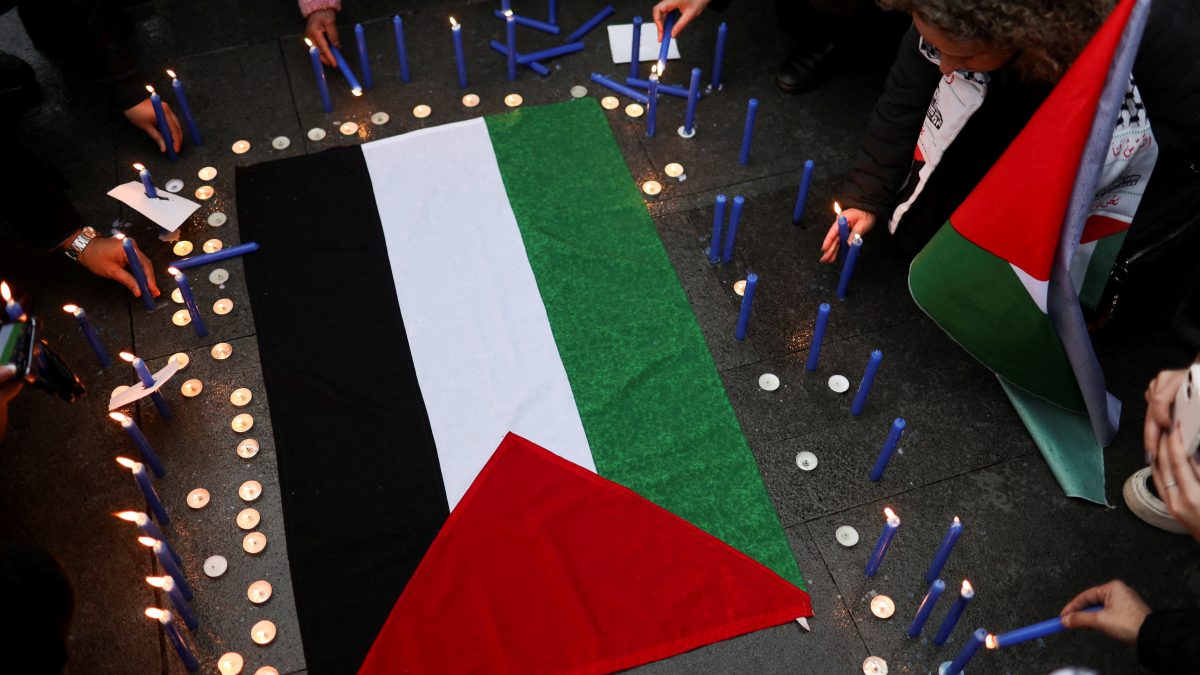Deals without outcome: How Israel-Palestine conflict stands unresolved
- July 19, 2024
- Posted by: Anil Trigunayat
- Category: Israel

)
)
Members of the Palestinian community living in Chile and supporters light candles around a Palestinian flag after attending a mass at Santiago’s cathedral to mark the 76th anniversary of the Nakba, amid the ongoing conflict between Israel and Hamas, in Santiago, Chile, June 9, 2024. REUTERS/Sofia Yanjari.
There is no dearth of conflicts in the world, especially in West Asia. Hotspots like Libya, Yemen, Syria, Iraq, Lebanon, and Sudan (Africa) continue to fester and foment trouble, and it is difficult to keep the lid on due to geopolitical and regional contestations. But the mother of all feuds—the Israel-Palestine conflict—has been unresolved for over seven-and-a-half-decades. Though 1948 became the cutoff date when the newly formed United Nations Security Council decided to create the basis for the ’two-state solution’ through UNSC Resolution 181, at least three major wars have taken place since then.
There were some efforts, like Camp David and the Oslo Accords, when a semblance of a Palestinian state in transition was established in the interim with the Palestinian Authority (PA) of Yasser Arafat in Ramallah. Despite the two Intifadas, the fight domestically and internationally for a sovereign state of Palestine continued. But then the militant ideology-driven Hamas took over the cause of Palestine by undertaking to demolish the State of Israel through an armed struggle.
The surprise element in its strategy and the softer supportive approach of the Israeli governments, including that of Netanyahu, to counter and defeat the efforts to unify the Palestinian movement sustained and supported Hamas. Consequently, the ‘two-state solution’ has continued to defy the Palestinian aspirations as Bibi refuses to pass on power from ‘Hamastan’ to ‘Fatahstan’.
You May Like
A 23-Year-Old From New Delhi Shows How She Earns ₹290,000 A DaySetfieseepRead More
Hamas has fought at least five wars with Israel since it came to power in Gaza through the discredited 2006 elections. The last one started on October 7 with the Hamas terror attacks, killing 1192 Israelis and taking a windfall of 248 hostages, which became its negotiating advantage against Israel.
Some hostages were released during the first truce engineered by Qatar, Turkey, and the USA, but they broke down much faster. Benjamin Netanyahu, running an ultra-right and ultra-conservative coalition government, decided to avenge the humiliation by vowing to destroy Hamas for good.
Since then, the Israeli Defence Forces (IDF) have killed over 36,000 Palestinians, including children and women, and injured over 85,000, with over 1.9 million Palestinians being displaced and made to run for life from one end to the other in this 380-square-kilometre strip, in search of food and safe shelter, as humanitarian relief supplies were not allowed to flow in.
Advertisement
As the US was not able to prevail upon Netanyahu, it devised a humanitarian supply pier and bridge on the Mediterranean after indulging in airdrops of supplies, both of which have been ineffective and inadequate, and the plight of the people continues to multiply. Rafah was the ‘red line’ that has been violated by Bibi, as even the 1979 Peace Deal with Egypt comes under stress.
Eight months on, these civilian casualties, including attacks on schools, hospitals, and relief convoys, have heavily impinged on the global conscience, which was reflected in the voting patterns at the UNGA and UNSC.
While the International Criminal Court (ICC) is likely to issue an arrest warrant against Netanyahu and others, including Hamas leaders, the International Court of Justice (ICJ) is discussing the genocide case against Israel brought in by South Africa and later joined by Egypt and Spain, among others.
Advertisement
The UN has also decided to include Israel in the black list of countries and organisations that harm children in conflict zones. In the meantime, to push for a ceasefire and pressure on Israel, Ireland, Spain, and Norway have recognised the State of Palestine, taking the tally to 146, much to the chagrin of Netanyahu.
With increasing protests all around, Jewish leverage, especially in the US and the West, has been decimated significantly. Even as Capitol Hill and Biden remain committed to Israeli security and its right of defence, their frustrations with an intransigent Netanyahu and his ultra-right troublemakers are quite evident.
Advertisement
As such, the impression of Netanyahu pursuing his personal agenda and effort to prolong his continuation in power over Israeli interests has also decimated his credibility with the Americans, even as the US is accused of complicity, deflection, and double standards. Presidential elections and Biden’s low ratings are also causing the predicament, as is his inability to persuade Israel towards a ceasefire, which has not borne fruit as yet.
Finally, on May 30, after the earlier proposal was accepted by Hamas and not Israel, Biden announced yet another three-phase deal, projecting it as an Israeli one that will secure the release of hostages, cessation of hostilities, and uninterrupted and immediate relief supplies, as the details still remain to be worked out. Prima-facie Hamas reacted positively despite the proposal seeking to disarm and disenfranchise Hamas from power.
Advertisement
According to Qatar and Hamas leader Ismael Haniyeh, it is still studying it, with only the issue of the guarantee of a complete ceasefire and the withdrawal of the IDF from Gaza remaining. Apparently, a fractious War Cabinet, with Benny Gantz and Defence Minister Yollav Gallant giving deadlines to Bibi for coming up with a ‘day after scenario, had agreed to the deal before Biden announced it.
But the Israeli cabinet was yet to be presented with it for discussion, where die-hard opponents of any peace deal like Ben Gvir and Smotrich will turn it down and may bring down Netanyahu as well. Hence, internal political calculations for Bibi’s personal and political stability, as well as balancing out with US efforts, are the key markers for any reasonable outcome and relief for the beleaguered people of Gaza. Bibi may even baulk yet again on any deal.
Ironically, both Hamas and the current Israeli government are hoping that the other side will reject the deal, which is the biggest predicament for the ordinary citizens of both Palestine and Israel, the emaciated world order, and the meek international community, which continues to hope that the war horizons will not expand and conflagrate.
The writer is a former Indian Ambassador to Jordan, Libya and Malta and is a Distinguished Fellow with leading think tank Vivekananda International Foundation. Views expressed in the above piece are personal and solely those of the author.
